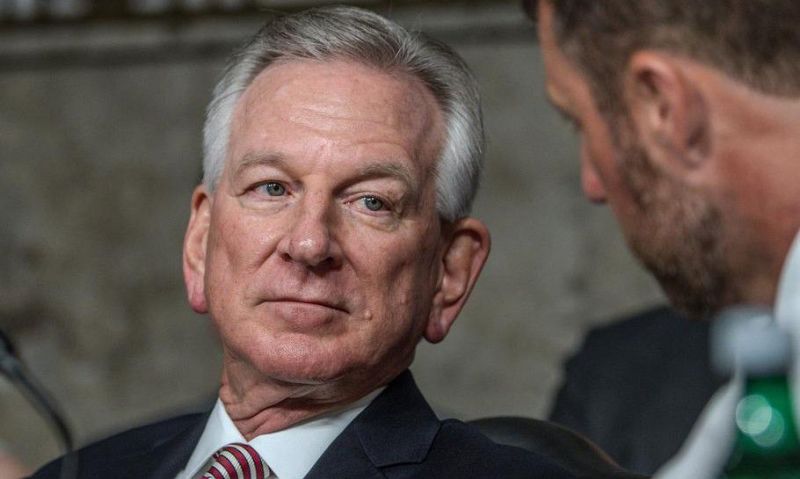
Senate committee votes for temporary rule change that would allow the upper chamber to start confirming large groups of military promotions.
A Senate committee on Tuesday voted for a temporary rule change that would allow the upper chamber to start confirming large groups of military promotions, even if Alabama Republican Sen. Tommy Tuberville keeps trying to block them.
The Senate Rules Committee voted 9-7 along party lines in favor of the standing order resolution. It will move next to the full Senate for a vote, which Senate Majority Leader Charles Schumer, D-N.Y., has said will happen as soon as possible.
“If every one of us had the temerity, the recklessness to do what Sen. Tuberville has done, we’d have no military,” Schumer said at the hearing. “We need to get these military nominees confirmed ASAP for the sake of our national security. … The idea of blocking the confirmations of military officers to make a political statement has long been considered unthinkable.”
If passed in the Senate, the resolution would change the military nominee confirmation rules for the remainder of the 118th Congress, which will run until January 2025. It would allow the upper chamber to confirm almost 400 military nominations that Tuberville has been blocking since February.
“Improvise, adapt and overcome. That’s what we’re doing here today,” said Sen. Amy Klobuchar, D-Minn., the committee chairwoman. “We are here today because one of our colleagues continues to hold up the entire chain of military promotions. … This massive hold is hurting our military readiness and our national security.”
Tuberville, a freshman senator who was a college football coach before he was elected in 2020, has been blocking all military promotions to protest a new Pentagon policy that reimburses service members who travel to another state to receive reproductive care, including abortions. That policy is a response to several Republican-controlled states restricting or outlawing abortions after the Supreme Court in 2022 struck down a decades-old decision that made the procedure legal nationwide.
Traditionally, the Senate has confirmed large groups of military nominees by unanimous voice vote because it would take far too long to confirm the nominees one by one. Under Senate rules, the process can be held up if a single senator objects, which Tuberville has been doing each time the upper chamber has attempted to move forward with the promotions.
To get around the hold, Senate Democrats have held two sessions to confirm the most senior military leadership nominees individually, including Air Force Gen. Charles “CQ” Brown as chairman of the Joint Chiefs of Staff, Gen. Eric Smith as commandant of the Marine Corps, Adm. Lisa Franchetti as chief of naval operations, Gen. Randy George as Army chief of staff and Gen. David Allvin as Air Force chief of staff.
During the second session, the Senate also confirmed Lt. Gen. Christopher Mahoney as Marine Corps assistant commandant just a few days after Smith was hospitalized after suffering a heart attack on Oct. 29. Smith had been performing the duties of commandant and assistant commandant because of Tuberville’s blockade.
At Tuesday’s hearing, several members of military families who traveled from various parts of the United States were there to show support for the plan to side-step Tuberville’s blockade.
“This is really serious business, this is not a schoolyard game,” said Tom Porter, vice president of government affairs at Blue Star Families, a community-based organization that advocates for military families. “[There are] so many impacts that [Tuberville] hasn’t even thought of.”
Blue Star Families recently sent a letter to Congress in which they pleaded with lawmakers to clear out the backlog of promotions. Almost two dozen military, veterans and research groups co-signed the letter.
“[Tuberville] really needs an intervention, if you will, by military families to help him understand what this means to them,” Porter said, adding the blockade is causing issues such as making it difficult for children who should be moving to new schools, causing problems for people who have already quit their jobs anticipating their spouse’s promotions, and putting families in limbo because their housing leases that were synched with their military assignments are expiring.
“So, all of those things mount up and it’s an incredible pain in the military community,” he said. “It’s such an affront to what we stand for.”
The resolution will need a bipartisan Senate super-majority to pass, or 60 votes. That means, in addition to every Democrat, at least nine Republicans will need to vote for it.
Many Republicans on the Senate Rules Committee spoke out Tuesday against the resolution, arguing mainly that it goes against Senate tradition and might erode powers of the minority party in the future. Senate Minority Leader Mitch McConnell, R-Ky., who has urged Tuberville to lift his blockade, voted against the resolution. He said he’s not ready to give up working with Tuberville on a different solution.
“I am going to oppose [the resolution] at this particular moment,” McConnell said.
“I will not support this effort to undermine the Senate process,” added Sen. Deb Fischer, R-Neb., the ranking Republican on the committee. “I hope my colleagues will join me in opposing this resolution.”
Some Democrats on the panel, such as Sen. Mark Warner, D-Va., issued strong warnings to Republicans.
“A lot of folks are asking, ‘What in the heck is going on when America’s military leadership can’t get the promotions that they have earned?’ ” he said. “This is one other example where we have got to get our act together.”
“This nine-month determination to undermine our national security and damage our military families is beyond unacceptable,” said Sen. Jeff Merkley, D-Ore. “I can’t speak more passionately about how wrong this is.”
- News

